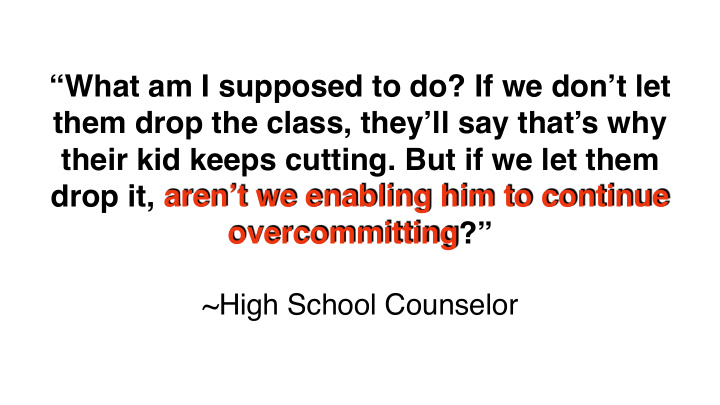



“What am I supposed to do? If we don’t let them drop the class, they’ll say that’s why their kid keeps cutting. But if we let them drop it, aren’t we enabling him to continue overcommitting?” ~High School Counselor
“How do we know when to push a kid to face their fear, or when to allow them some slack? It feels like a double edged sword!” ~Middle School Teacher
“I suspect we should probably limit the number of commitments our students can take on, but if we don’t give our students the opportunities to participate that other schools do, we’ll be out of business.” ~High School Principal
“I know that our kids are experiencing unprecedented amounts of stress and anxiety. I just don’t see a solution to the problem. Our job is to prepare them and get them into a good school ” ~Principal of K-8 School
Suicide
Suicide What does Suicide Sound Like?
Understanding the Terminology
Active “Suicidal Ideation” Passive
ACTIVE SUICIDAL IDEATION •Serious and Real intent to take one’s own life •Person has a plan and intends to act on it •Person may or may not have the means to act on their plan
“I’m bored with this life. I want a new one. I thought taking those pills would be like exchanging this life for another one…like you do at Target.” ~Sophomore Girl (16yrs) who had attempted
PASSIVE SUICIDAL IDEATION •Thoughts or wish to die but does not have a plan •“I wish I weren’t here…” •“Things would be better if I just didn’t wake up in the morning…” •“I wouldn’t mind it if a car were to hit me while crossing the street…”
“I know that my life is made up of moments. Right now, there’s just too many moments… and none of them are any good. If I could only make it to where there were no moments…” ~Senior Boy (17 yrs) with passive suicidal ideation
RISK ASSESSMENT •Are you thinking of killing yourself? Wish you were dead? •Do you have a plan? •Do you have the means to execute your plan?
RISK ASSESSMENT •Have you ever attempted suicide before? •Have you thought of suicide before? •Do you know of anyone who has completed Suicide?
Remember… •Talking about suicide does not cause suicide •Be DIRECT and clear •Youth want to talk about it, although may not initiate conversation
Warning Signs 1.Overlapping 2.Drastic 3.Consistency 4.Intensity
Warning Signs Talking Health Behavior Environment History Mood
Warning Signs: TALKING • “I’m such a burden” • “I feel trapped…” • “I can’t take the pain anymore” • “I have no reason to live” • “I think I might kill myself”
Warning Signs: Behavior • Increased use of alcohol or drugs • Looking for ways to kill themselves (searching online) • Acting recklessly • Withdrawing
Warning Signs: Behavior • Isolating- family and friends • Sleeping too much or too little • Saying Goodbye (texting) • Giving away prized possessions • Aggression
Warning Signs: Mood • Depression and/or Anxiety • Loss of interest • Rage • Irritability • Humiliation
Warning Signs: Health • Depression • Bipolar (manic-depressive) • Schizophrenia • Borderline personality • Antisocial personality
Warning Signs: Health • Chronic illness • severe injury • Horomonal/ Thyroid • Dysthymia/Cyclothymia • Substance abuse • Conduct Disorder
Warning Signs: Environment • Stressful life events (death, divorce, or move) • Prolonged stress factors-, bullying, relationships • Access to lethal means-firearms and drugs
Warning Signs: Environment • Exposure to another person’s suicide • Exposure to graphic/ sensationalized accounts of suicide • Physical violence
Warning Signs: Historical • Previous suicide attempts • Family history of • suicide attempts • Mental Illness • Violent Behavior
Depression Types • Unipolar/ Major Depressive D/O • BiPolar I/II • Dysthymia
Is it Depression or Sadness? • Severity • Suddenness • Frequency
Depression Symptoms • Sadness • Irritability • Withdrawal/ Isolation • Decreased Academic Performance • Loss of Interest • Substance abuse
Depression Symptoms • Sleep (hyper/hypo) • Appetite (increase/loss) • Aggression/ Recklessness • Illegal activity • Suicidal thoughts (active/passive) • Concerned Friends or parents
Recommend
More recommend